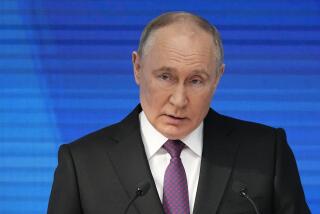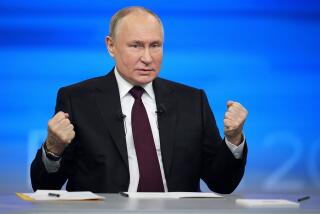Gorbachev Preoccupied by Own Crisis : Soviets: He combines a plea with a warning of a disaster that is already spreading across one-sixth of the globe.
MADRID — When Soviet President Mikhail S. Gorbachev spoke at the opening of the Middle East peace conference here Wednesday about a “crisis of tremendous proportions,” he meant not the Arab-Israeli conflict but the political and economic collapse of his own country.
Even as he sat beside President Bush to open a peace conference sponsored by the Soviet Union and the United States, Gorbachev was clearly preoccupied by his own country’s domestic problems and the international impact of the disintegration of one of the world’s most powerful nations.
“Of late, the world has been confronted by yet another crisis of tremendous proportions,” Gorbachev said in a somber, 12-minute speech. “What I have in mind is my own country. This became inevitable as a result of underlying contradictions that built up over a long period.
“A great country, in fact, is going through a great transformation,” he said. “It is a painful and arduous process, which has brought about personal tragedies and interethnic and regional conflicts.”
Although Gorbachev also expressed his hopes for resolving the Arab-Israeli conflict, this was not the speech expected from a Nobel Peace Prize laureate at the start of the conference on peace in the Middle East. It only dramatized the magnitude of the crisis in the Soviet Union and its shrunken global influence.
“Much in the world depends on how our crisis will be resolved,” he said, adding: “One may hope that the crises arising in our time will not be as protracted as the one we are dealing with here.”
His comments were plainly both a plea for help and a warning to the international community of a disaster that is already spreading across one-sixth of the globe.
“The world community is becoming increasingly aware,” he continued, “that what is happening in the Soviet Union has a larger bearing than any regional conflict on the vital interests of the greater part of today’s world.”
With an allusion to the mounting civil war in Yugoslavia and the threat it poses to European stability, Gorbachev only hinted at the dangers that could come with the breakup of the Soviet Union.
“Our peoples will have to go through a difficult period of transition,” he said, “but it’s important because under the new conditions--it was our country that launched the initiative to end confrontation and to join up with the rest of the world--the world has not remained indifferent to our great cause.
“Today, we hear not only murmurs of approval and good wishes, but we are also beginning to see practical support, as well. And this is a very significant sign of the movement towards a new era, a new age.”
Although Gorbachev spoke broadly, referring to U.S.-Soviet efforts to promote nuclear disarmament, of the settlement of regional conflicts in Africa, Asia and Central America and of the evolving “new world order,” he acknowledged that the turmoil in the Soviet Union has clearly reduced the role it could play in the Middle East and elsewhere.
Yet he was also hopeful, seeing in his country’s experience a lesson for others on the need to promote democracy, abandon communism and seek solutions to the world’s problems in “new thinking.”
“Once this crisis is overcome, our union will acquire new qualities and potential as a world power based materially on a market economy as part of the world economy, politically on democracy as part of universal democracy and intellectually on new thinking,” Gorbachev said.
Although the Soviet Union will clearly play a minor role in the Middle East conference, he stressed its contribution to a much-changed international environment that made the talks possible.
The Madrid conference, Gorbachev said, stems directly from an agreement he reached with Bush in September, 1990, when he pledged Soviet support for U.S. efforts to form the coalition that eventually drove an Iraqi invasion force from Kuwait. They had agreed then, he recalled, that a new effort to settle the Arab-Israeli conflict would follow resolution of the Gulf crisis.
More to Read
Sign up for Essential California
The most important California stories and recommendations in your inbox every morning.
You may occasionally receive promotional content from the Los Angeles Times.










